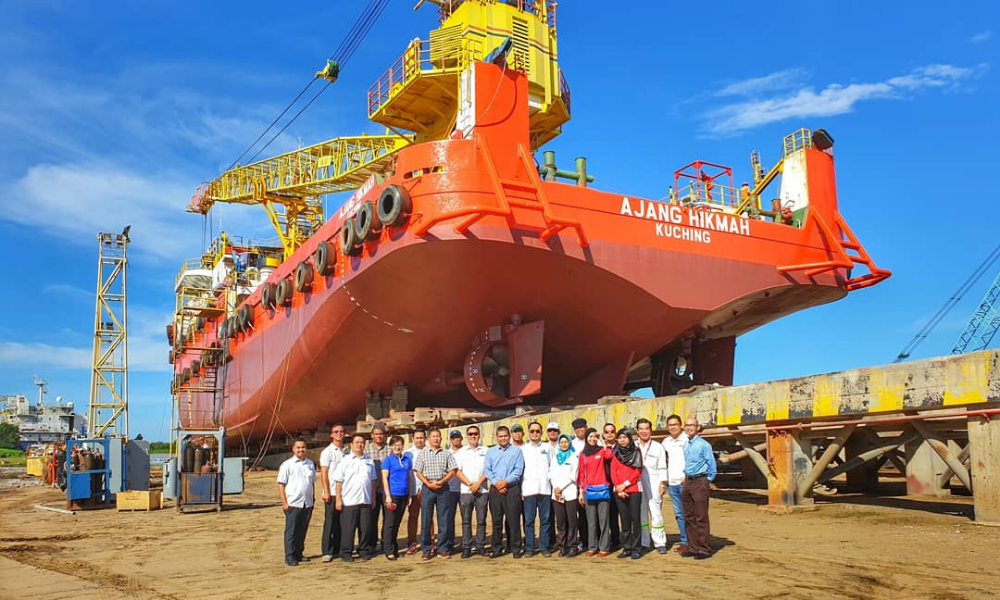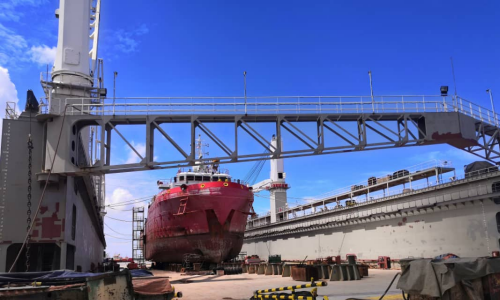AMIM applaud decision by Petronas to renew the ageing fleet of Offshore Support Vessels (OSVs)
Association of Marine Industries of Malaysia (AMIM) expressed appreciation over the report that Petroliam Nasional Bhd (Petronas) has recently put out a tender of building 16 Offshore Support Vessels (OSVs).
Collaborative Agreement with Petronas
AMIM has signed the Memorandum of Understanding (MOU) with Petronas on 24th November 2020 with the main objective to support local shipbuilding ecosystem by developing fit-for-purpose OSV design for oil and gas industry.
“I also wish to extend my appreciation to Petronas, for the opportunity to be part of this historic moment. The shipbuilding and ship repair (SBSR) industry players especially AMIM members are really thankful that the new OSVs have to be built in the local shipyards. Furthermore, SBSR Industry & its spillover effects can contribute significantly to Malaysian Economic, not just to shipyards, but the whole maritime industry ecosystem. This is timely for the recovery of Malaysia’s economy after COVID19 disrupting the global economy” said President Soo.
Petronas New Build Program: Safina Project Phase 1 (Prioritisation of Local Built Vessels)
All 10 yards that were shortlisted by Petronas for the Phase 1 of Safina Project, are AMIM members. All bidders are required to engage these listed shipyards for construction of 16 OSVs.
Local shipyards have the capacity and capability to involve in the big national project such as Safina Project. Malaysian shipyards have built over 297 OSVs since 2005 and have been sold worldwide.
SBSR industry in Malaysia covers an extensive range of ships, most of which specialize in building small-medium sized vessels such as ferries, barges, tugs, offshore support vessels, yachts, fishing vessels, and patrol crafts. We had exported our Malaysian Made vessels to the foreign countries such as Australia, New Zealand, Pacific Islander (Fiji, Tokelau, New Caledonia), UAE, Qatar, Turkey, Indonesia, Thailand and even our closest neighbor, Singapore.
Continuation of Tax Incentives for SBSR
However, the SBSR industry needs a strong and consistent policy direction in order to remain resilient and competitive regionally and globally. The Bona Fide Status incentive is where material and equipment for ship building and ship repair are granted Import Tax and Sales Tax exemption. This would create an equal level of playing field with our neighbouring countries which enjoy the tax exemption for SBSR industry and can boost the growth of the SBSR industry.
It is indeed timely that the announcement made by YB Minister of Finance during the Budget 2021 speech on the extension of Bona Fide Status Incentive until 31st December 2022. It will definitely provide huge support to shipyards which will be participating in providing a competitive pricing to the Petronas’ New Build Program.
President Soo highlighted, “Finally it’s implemented after countless engagements & meetings especially with MOF & MITI. As part of the Bona Fide Task Force set up by the Government, AMIM would like to extend the utmost gratitude towards the efforts & decision by MOF & MITI on the extension of the tax incentive.”
However, the ship builders still have some concerns—the extension of existing tax incentives until December 2022 is still insufficient and difficult for the shipyards to plan and encourage new investments in SBSR industry to increase capacity and capability. “This Petronas’ New Build Program is looking to build up to 100 vessels over the next four to five years to phase out the older vessel reaching the 15 years age limit. Even the Phase 1 of Petronas’ New Build Program cannot be completed within timeframe of the new extension deadline. Usual ship building tender or bidding process takes about 6 months while ship building construction duration is about 18 - 24 months. Shipyards are in difficult position to bid for the new contract if the subsequent renewal of Bona Fide cannot be ascertained. Shipbuilders are uncertain whether to factor in the duty and tax for materials and equipment used directly for construction of vessels or otherwise.” President Soo reiterated his concerns.

Conclusion
The maritime industry constitutes a very important sector of the national economy as it is the key facilitator of the trade and which is almost entirely dependent on shipping and its marine related and support ecosystem.
Fostering the development and expansion of the national maritime capability and capacity is therefore crucial in public policy planning and initiatives, including with a view to exploiting the vast economic benefits of the extended multiplier effects of the development of the maritime cluster industries.
AMIM is of the view that it is only with the right environment and institutional framework that the maritime industry can grow and contribute significantly to the GDP, including fostering employment opportunities and enhancing national development. With the strong support and involvement of all stakeholders, government and industry alike, the SBSR industry will be able to flourish and benefit the nation as a whole. Malaysia will then be able to compete on a level playing field with other international parties and set the momentum for an even greater growth of the SBSR industry in the future.
For more info about AMIM, please do not hesitate to call AMIM Office at +6013 313 5069 or email at [email protected].
RM12.50 / month
- Unlimited access to award-winning journalism
- Comment and share your opinions on all our articles
- Gift interesting stories to your friends
- Tax deductable
